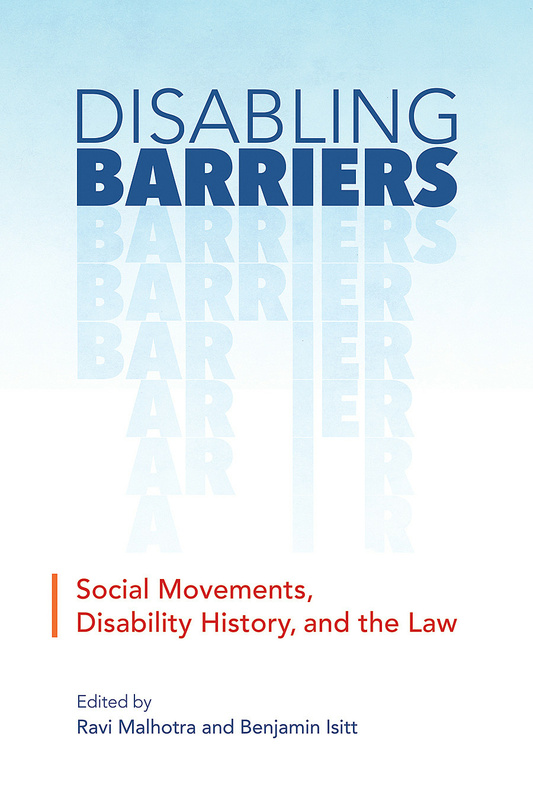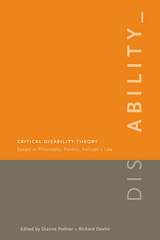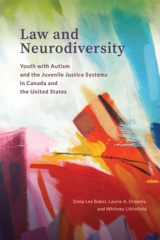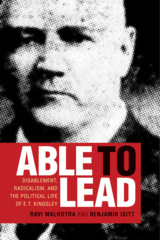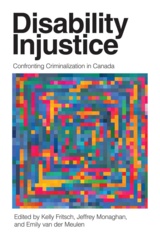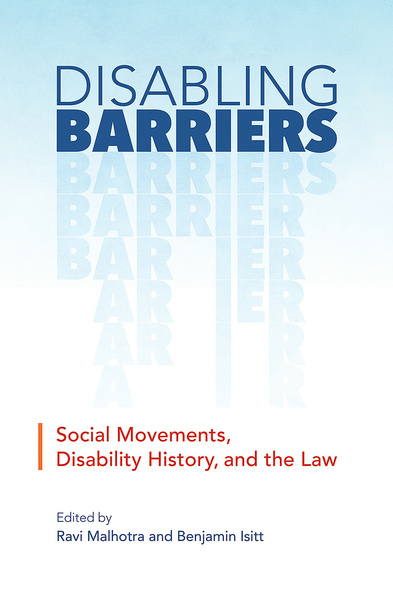
Disabling Barriers
Social Movements, Disability History, and the Law
Disabling Barriers analyzes issues relating to disability at different moments in Canadian and American history. In this volume, legal scholars, historians, and disability-rights activists demonstrate that disabled people can change their social status by transforming the political and legal discourse surrounding disablement.
Traditionally, disabled people were regarded as objects of pity and condescension. The rise of the social model of disablement – which identifies barriers, rather than physiological impairments, as the main problem facing people with disabilities – has resulted in a dramatic reconfiguration of how we regard political and legal structures affecting people with disabilities. Employing tools from the fields of law and history, this volume explores how disabled people have been portrayed and treated in a variety of contexts, including within the labour market, the workers’ compensation system, the immigration process, and the legal system (both as litigants and as lawyers).
This original contribution deepens our knowledge of the role of people with disabilities within social movements in disability history. The contributors encourage us to rethink our understanding of both the systemic barriers disabled people face and the capacity of disabled people to effect positive societal change.
This book will be of interest to scholars in the fields of disability studies, disability history, and disability law, as well as to disability activists in Canada and the United States.
Disabled Barriers is an intricate and thorough analysis of the interaction between labour histories and disability rights. The collection introduces a focus that has been largely ignored in the literature but would be quite valuable to researchers of labour and disability studies.
This diverse collection was a pleasure to read. The editors’ disparate backgrounds deliver on a promise suggested from the start: to launch a deep conversation between legal scholars and historians on the premises and promises of social movements where disability has been concerned.
Disabling Barriers examines the concept of disability in relation to broader themes of political economy and social theory. The contributors take an explicitly interdisciplinary approach, examining disability in relation to class and gender, while always remaining aware of the personal issues associated with disability. The essays examine a variety of subjects, some well known, others much less so, but always with fresh approaches and interesting insights. The book provides a valuable addition to the field and deserves a wide audience.
Ravi Malhotra is a full professor in the Faculty of Law, Common Law Section, at the University of Ottawa. He has been a disability-rights advocate for more than twenty-five years and is a member of the Human Rights Committee of the Council of Canadians with Disabilities. He is the co-author (with Morgan Rowe) of Exploring Disability Identity and Disability Rights through Narratives: Finding a Voice of Their Own, which examines the narratives and life experiences of adults with physical disabilities. He is the editor of the interdisciplinary anthology Disability Politics in a Global Economy: Essays in Honour of Marta Russell, which explores the impact of globalization on disability politics.
Benjamin Isitt is a historian and legal scholar specializing in the relationship between social movements and the state in Canada and globally. He is the author of three books that examine social movements and states in diverse historical and geographic contexts: From Victoria to Vladivistok: Canada’s Siberian Expedition, 1917–19; Militant Minority: British Columbia Workers and the Rise of a New Left, 1948–1972; and Duty With Dignity: The Professional Employees’ Association in British Columbia. Alongside his scholarly work, Benjamin Isitt serves the public as a city councillor and regional director in Victoria, BC.
Contributors: Odelia R. Bay, Jay Dolmage, Anne Finger, Dustin Galer, Mark Leier, Geoffrey Reaume, Jen Rinaldi, Megan A. Rusciano, Eric Tucker, and Mark Walters
Foreword / Bryan D. Palmer
Introduction: Bringing History and Law to Disability Studies / Ravi Malhotra and Benjamin Isitt
Part 1: Historical Debates on Work and Disability
1 Bearing the Marks of Capital: Solidarities and Fractures in E.T. Kingsley’s British Columbia / Mark Leier
2 Employers, Disabled Workers, and the War on Attitudes in Late Twentieth-Century Canada / Dustin Galer
3 Gender and the Value of Work in Canadian Disability History / Geoffrey Reaume
Part 2: Debates in Disability Studies
4 Dancing with a Cane: The Public Perception of Franklin Delano Roosevelt’s Disability / Anne Finger
5 Disability in Motion: Aesthetics, Embodiment, Sensation, and the Emergence of Modern Vestibular Science in the Nineteenth Century / Mark Walters
6 “Of Dark Type and Poor Physique”: Law, Immigration Restriction, and Disability in Canada, 1900–30 / Jen Rinaldi and Jay Dolmage
Part 3: Legal Debates
7 Battling the Warrior-Litigator: An Exploration of Chronic Illness and Employment Discrimination Paradigms / Odelia R. Bay
8 Towards Full Inclusion: Addressing the Issue of Income Inequality for People with Disabilities in Canada / Megan A. Rusciano
9 Compensating Work-Related Disability: The Theory, Politics, and History of the Commodification-Decommodification Dialectic / Eric Tucker
Index

